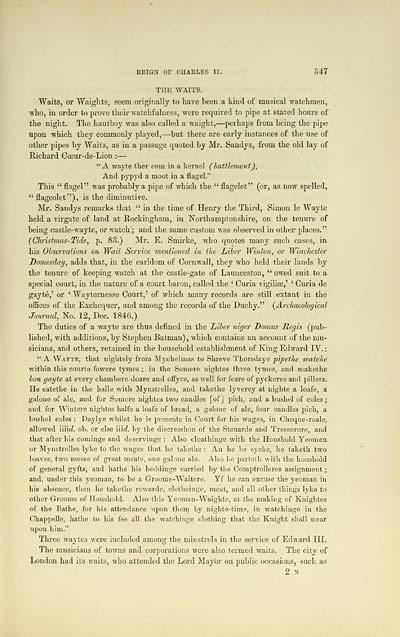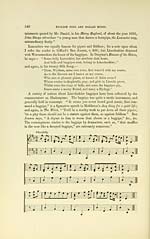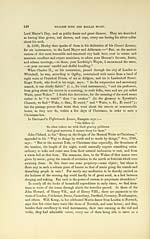Glen Collection of printed music > Printed text > Popular music of the olden time > Volume 2
(171) Page 547 - Waits
Download files
Complete book:
Individual page:
Thumbnail gallery: Grid view | List view

REIGN OF CHARLES II. 547
THIS WAITS.
Waits, or Waights, seem originally to have been a kind of musical watchmen,
who, in order to prove their watchfulness, were required to pipe at stated hours of
the night. The hautboy was also called a waight, — perhaps from being the pipe
upon which they commonly played, — but there are early instances of the use of
other pipes by Waits, as in a passage quoted by Mr. Sandys, from the old lay of
Richard Coeur-de-Lion : —
" A wayte ther com in a kernel (battlement),
And pypyd a moot in a flagel."
This " flagel" was probably a pipe of which the " flagelet" (or, as now spelled,
"flageolet"), is the diminutive.
Mr. Sandys remarks that " in the time of Henry the Third, Simon le Wayte
held a virgate of land at Rockingham, in Northamptonshire, on the tenure of
being castle-wayte, or watch'; and the same custom was observed in other places."
(Christmas- Tide, p. 83.) Mr. E. Smirke, who quotes many such cases, in
his Observations on Wait Service mentioned in the Liber Winton, or Winchester
Domesday, adds that, in the earldom of Cornwall, they who held their lands by
the tenure of keeping watch at the castle-gate of Launceston, " owed suit to a
special court, in the nature of a court baron, called the ' Curia vigiliae,' ' Curia de
gayte,' or ' Wayternesse Court,' of which many records are still extant in the
offices of the Exchequer, and among the records of the Duchy." (Archaeological
Journal, No. 12, Dec. 1846.)
The duties of a wayte are thus defined in the Liber niger Domus Regis (pub-
lished, with additions, by Stephen Batman), which contains an account of the mu-
sicians, and others, retained in the household establishment of King Edward IV. :
" A Wayte, that niglitely from Mychelnias to Shreve Thorsdaye pipethe matclie
within this couvte fowere tymes ; in the Somere nightes three tymes, and makethe
bon gayte at every chambere doare and offyce, as well for feare of pyckeres and pillers.
He eatethe in the halle with Mynstrelles, and takethe lyverey at nighte a loafe, a
galone of ale, and for Somere nightes two candles [of] pieh, and a bushel of coles ;
and for Wintere nightes halfe a loafe of bread, a galone of ale, four candles pich, a
bushel coles : Daylye whilst he is presente in Court for his wages, in Cheque-roale,
allowed iind. ob. or else i\\d. by the diseresshon of the Steuarde and Tressorore, and
that after his cominge and deservinge : Also cloathinge with the Houshold Yeomen
or Mynstrelles lyke to the wages that lie takethe : An he be sycke, he taketh two
loaves, two messe of great meate, one galone ale. Also he parteth with the houshold
of general gyfts, and hathe his beddinge carried by the Comjjtrolleres assignment ;
and, under this yeoman, to be a Groome-Waitere. Yf he can excuse the yeoman in
his absence, then he takethe rewarde, clotheinge, meat, and all other things lyke to
other Grooms of Houshold. Also this Yeoman- Waighte, at the making of Knightes
of the Bathe, for his attendance upon them by nighte-time, in watchinge in the
Ohappelle, hathe to his fee all the watchinge clothing that the Knight shall wear
upon him."
Three waytes were included among the minstrels in the service of Edward III.
The musicians of towns and corporations were also termed waits. The city of
London had its waits, who attended the Lord Mayor on public occasions, such as
2 N
THIS WAITS.
Waits, or Waights, seem originally to have been a kind of musical watchmen,
who, in order to prove their watchfulness, were required to pipe at stated hours of
the night. The hautboy was also called a waight, — perhaps from being the pipe
upon which they commonly played, — but there are early instances of the use of
other pipes by Waits, as in a passage quoted by Mr. Sandys, from the old lay of
Richard Coeur-de-Lion : —
" A wayte ther com in a kernel (battlement),
And pypyd a moot in a flagel."
This " flagel" was probably a pipe of which the " flagelet" (or, as now spelled,
"flageolet"), is the diminutive.
Mr. Sandys remarks that " in the time of Henry the Third, Simon le Wayte
held a virgate of land at Rockingham, in Northamptonshire, on the tenure of
being castle-wayte, or watch'; and the same custom was observed in other places."
(Christmas- Tide, p. 83.) Mr. E. Smirke, who quotes many such cases, in
his Observations on Wait Service mentioned in the Liber Winton, or Winchester
Domesday, adds that, in the earldom of Cornwall, they who held their lands by
the tenure of keeping watch at the castle-gate of Launceston, " owed suit to a
special court, in the nature of a court baron, called the ' Curia vigiliae,' ' Curia de
gayte,' or ' Wayternesse Court,' of which many records are still extant in the
offices of the Exchequer, and among the records of the Duchy." (Archaeological
Journal, No. 12, Dec. 1846.)
The duties of a wayte are thus defined in the Liber niger Domus Regis (pub-
lished, with additions, by Stephen Batman), which contains an account of the mu-
sicians, and others, retained in the household establishment of King Edward IV. :
" A Wayte, that niglitely from Mychelnias to Shreve Thorsdaye pipethe matclie
within this couvte fowere tymes ; in the Somere nightes three tymes, and makethe
bon gayte at every chambere doare and offyce, as well for feare of pyckeres and pillers.
He eatethe in the halle with Mynstrelles, and takethe lyverey at nighte a loafe, a
galone of ale, and for Somere nightes two candles [of] pieh, and a bushel of coles ;
and for Wintere nightes halfe a loafe of bread, a galone of ale, four candles pich, a
bushel coles : Daylye whilst he is presente in Court for his wages, in Cheque-roale,
allowed iind. ob. or else i\\d. by the diseresshon of the Steuarde and Tressorore, and
that after his cominge and deservinge : Also cloathinge with the Houshold Yeomen
or Mynstrelles lyke to the wages that lie takethe : An he be sycke, he taketh two
loaves, two messe of great meate, one galone ale. Also he parteth with the houshold
of general gyfts, and hathe his beddinge carried by the Comjjtrolleres assignment ;
and, under this yeoman, to be a Groome-Waitere. Yf he can excuse the yeoman in
his absence, then he takethe rewarde, clotheinge, meat, and all other things lyke to
other Grooms of Houshold. Also this Yeoman- Waighte, at the making of Knightes
of the Bathe, for his attendance upon them by nighte-time, in watchinge in the
Ohappelle, hathe to his fee all the watchinge clothing that the Knight shall wear
upon him."
Three waytes were included among the minstrels in the service of Edward III.
The musicians of towns and corporations were also termed waits. The city of
London had its waits, who attended the Lord Mayor on public occasions, such as
2 N
Set display mode to: Large image | Transcription
Images and transcriptions on this page, including medium image downloads, may be used under the Creative Commons Attribution 4.0 International Licence unless otherwise stated. ![]()
| Special collections of printed music > Glen Collection of printed music > Printed text > Popular music of the olden time > Volume 2 > (171) Page 547 - Waits |
|---|
| Permanent URL | https://digital.nls.uk/91364046 |
|---|
| Shelfmark | Glen.254a |
|---|---|
| Additional NLS resources: | |
| Attribution and copyright: |
|
| Description | Scottish songs and music of the 18th and early 19th centuries, including music for the Highland bagpipe. These are selected items from the collection of John Glen (1833 to 1904). Also includes a few manuscripts, some treatises, and other books on the subject. |
|---|
| Description | The Glen Collection and the Inglis Collection represent mainly 18th and 19th century Scottish music, including Scottish songs. The collections of Berlioz and Verdi collected by bibliographer Cecil Hopkinson contain contemporary and later editions of the works of the two composers Berlioz and Verdi. |
|---|

